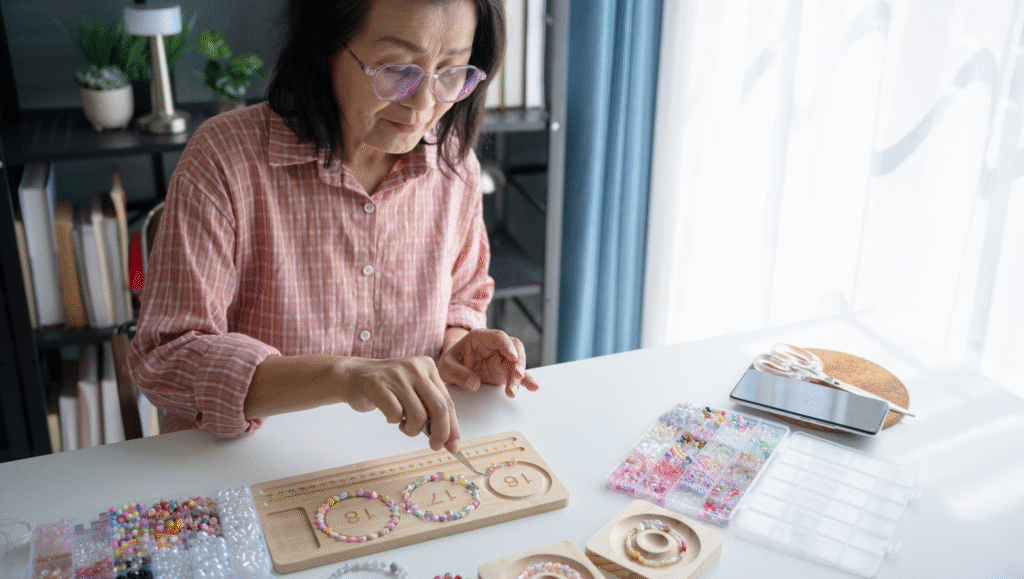Hobbies for older people after 60

Turning 60 does not mean you have used up your chances to explore, create or simply delight in something new. In fact, this stage of life can be the ideal moment to reconnect with passions you set aside, or to explore hobbies for older people that you never had time for.
Table of Contents
Healthy ageing is not only about eating well or keeping active. It is also about how you spend your time. Did you know that picking up hobbies you enjoy can lift your mood, keep your mind sharp and even help you feel more connected to others?
Hobbies for older people are not just ways to pass the time. They add colour and purpose to daily life, whether that is tending to a garden, painting, joining a walking group or playing a game with the grandchildren. Even small moments of joy, done regularly, can make a real difference to your wellbeing.
Why hobbies for older people are more than “time fillers”
As we age, maintaining engagement in meaningful activities can have real benefits. Research shows that staying active in creative, productive or social pursuits can support cognitive health, boost mood and nurture purpose.
One study comparing older adults across multiple countries found that having a hobby was linked to fewer depressive episodes and higher life satisfaction.

Even small adjustments make a difference. Hobbies for older people do not have to be strenuous or ambitious to matter. What counts is that they connect you to something you care about.
Steps to rekindle an old passion or discover new hobbies for older people
Below is a practical guide to reigniting interest in activities, especially when your lifestyle or physical capacity may have shifted.
1. Start with conversation
Ask yourself or someone you trust:
- What did I enjoy doing years ago, but set aside?
- Is there something I have long wanted to try, but never did?
- Which activities feel calming, creative, or energising now?
Even casual talk can unearth hobbies for older people that may have been forgotten.
2. Be gentle with adaptation
Your body, daily rhythm, or energy levels might not be the same as decades ago. But that does not mean you must give up. Instead:
- Use larger tools (for example, larger paintbrushes or thicker yarn)
- Try seated or low-impact versions (for example, chair yoga, indoor gardening)
- Break tasks into smaller chunks
- Use technology such as digital art, audio recording, or adaptive devices to reduce strain
These simple adjustments make many hobbies for older people easier and more enjoyable.
3. Explore local or virtual opportunities
Community centres, libraries, or senior groups often offer classes, workshops or meetups tailored to older adults.
If mobility or distance is an issue, many hobby groups operate online, including art, writing, music and gardening forums. This makes hobbies for older people more accessible, no matter their location.
4. Try several things, then commit
You do not need to settle on the “one and only.” Try out a few activities and see which bring you joy or calm. Once something fits, set aside regular time, even if it is just 15 to 30 minutes per session.
5. Invite companionship
Doing a hobby with someone, whether family, friend, or care support person, boosts motivation, provides accountability and deepens connection. Hobbies for older people can also be a way to strengthen bonds with loved ones.
Top hobbies for older people to spark inspiration
Here are hobby ideas popular among people in their 60s, adapted for flexibility:
- Painting, sketching, or simple crafts
- Gardening (container plants, indoor gardens)
- Photography, including on smartphones
- Writing memoirs, poetry, or journaling
- Walking groups, gentle tai chi or movement classes
- Birdwatching or nature observation
- Puzzles, board games or strategy games
- Learning a language, music, or digital skills
- Volunteering in community or virtual settings

Exploring these options shows just how broad hobbies for older people can be, from calm, reflective activities to social or physical ones.
Overcoming common obstacles
- Physical limitations: Adapt the tools and environment so your body does not feel strained.
- Waiting for “perfect” time: Start small. The expectations of perfection often block action.
- Isolation or lack of community: Reach out, even via online groups. Shared interest breeds connection.
- Doubt or self-judgement: Remind yourself that the value lies in the doing, not a perfect output.
Removing barriers makes hobbies for older people more sustainable in the long term.
Your interests matter: Let Leora help
Rediscovering or exploring a hobby can enrich your life. But daily challenges, such as mobility, energy or the weight of routines, sometimes make it hard to follow through. That is where Leora Healthcare comes in.
If you or someone you care for would like support in caring for your home, managing daily tasks or adapting your environment so you can focus on what matters, our support workers are here. We can help with transport, preparing for your creative time, setting up your space or any assistance that lets you reclaim those special moments.
We would love to help you step into your new (or renewed) chapter, doing what brings joy.





